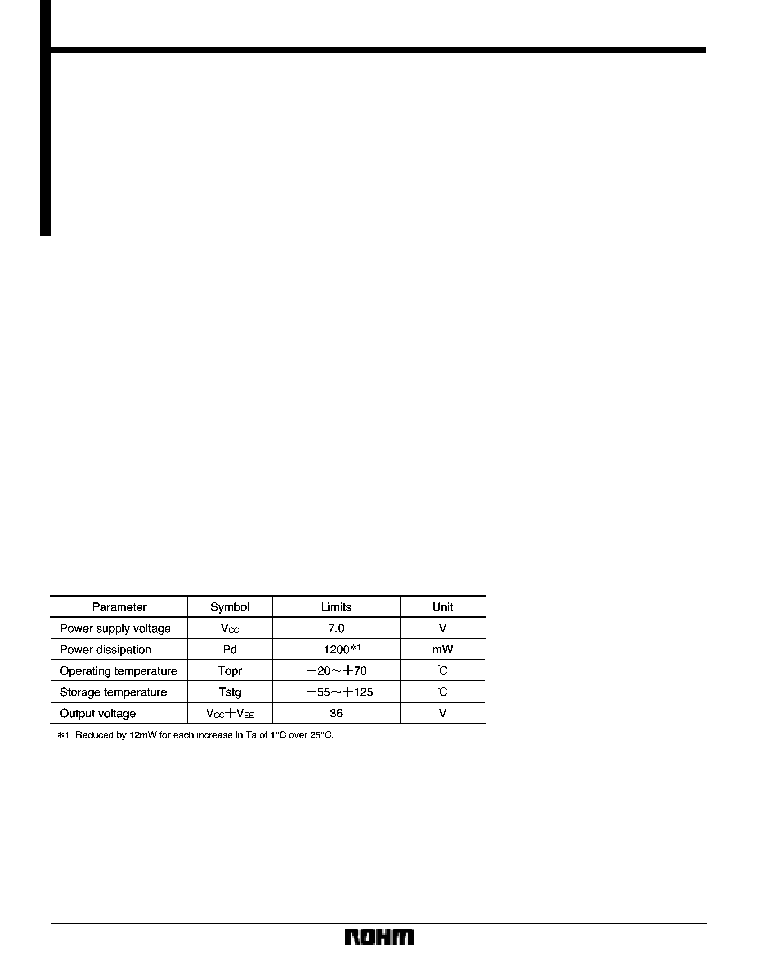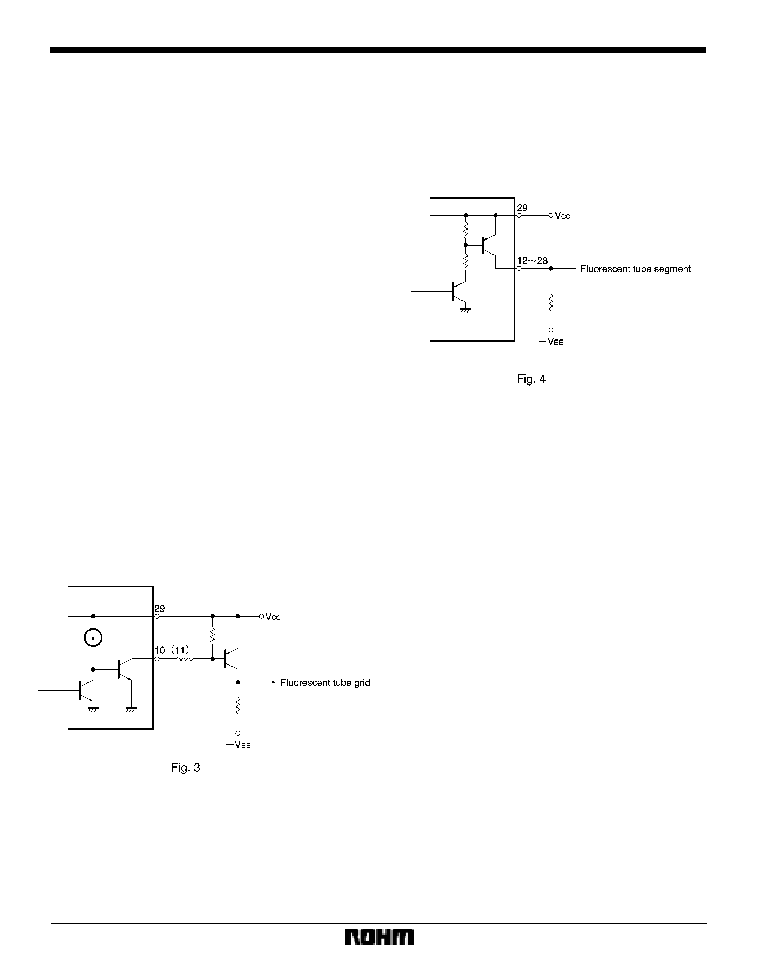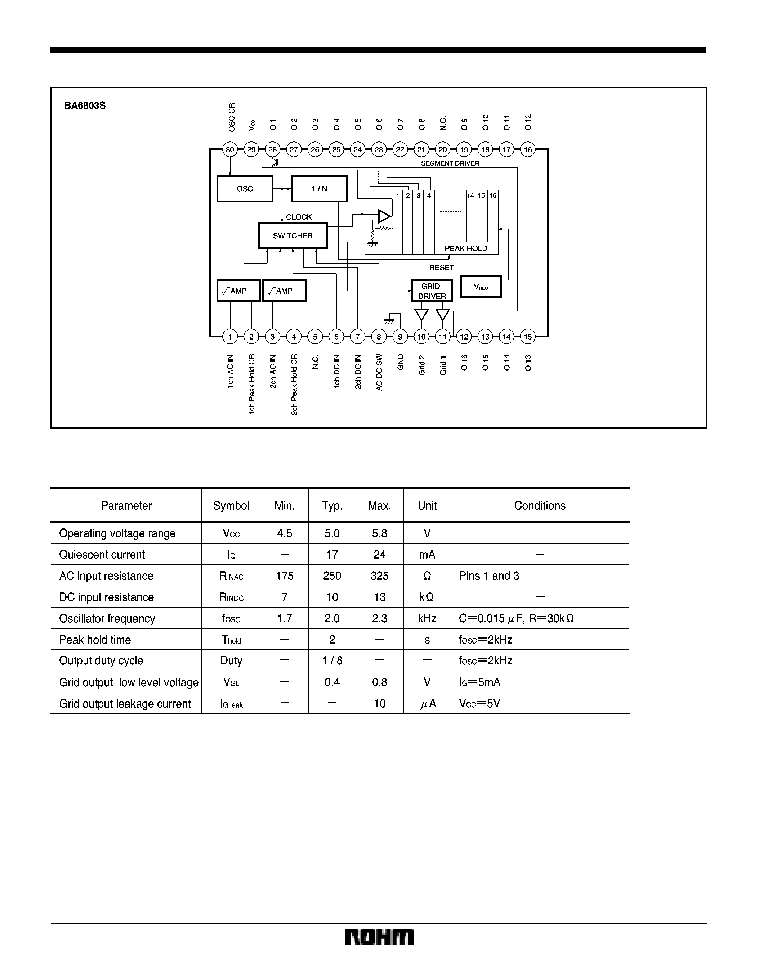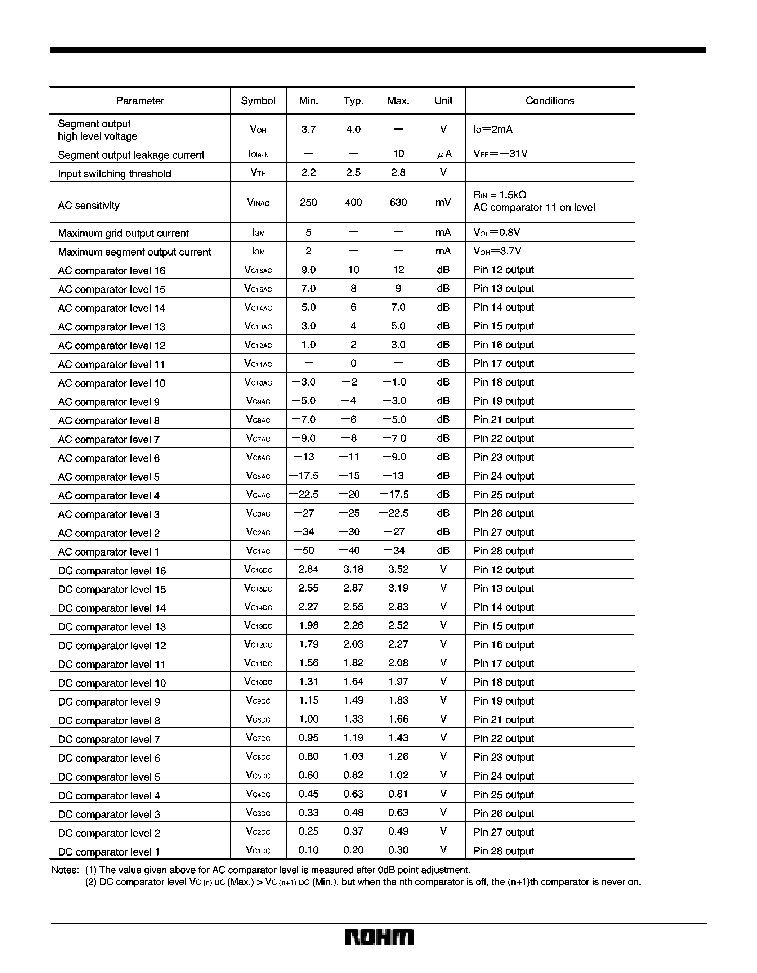
811
Audio ICs
Fluorescent display tube level meter
driver, 16-point
2 channel, VU scale,
bar display
BA6803S
The BA6803S is a two-channel, 16-point fluorescent display tube driver for VU-scale bar-level meters. It uses a dynamic-
drive system and has both AC and DC inputs.
The AC input mode has a peak hold circuit. The IC features a power-on mute, and the output block can directly drive
fluorescent display tubes, so few external components are required.
The grid output duty cycle is 1 / 8.
F
Applications
Level meters for all types of AV equipment
F
Features
1) Uses dynamic-drive system to display two 16-point
channels. 30-pin SDIP package.
2) AC and DC inputs provided. Switching function al-
lows two-mode display.
3) Upper 12 points have peak hold function in AC mode
(two seconds typ.).
4) Power-on mute function.
5) Dynamic-drive system reduces the power dissipa-
tion of the fluorescent display tube power supply.
6) Square root compression amplifier built in.
F
Absolute maximum ratings (Ta = 25
_
C)

815
Audio ICs
BA6803S
F
Circuit operation
(1)
Input block
The AC input pins are pins 1 and 3, and the DC input pins
are pins 6 and 7. Pin 8 is used to switch between the AC
and DC inputs. When the input to pin 8 is "H", AC input
is selected (pins 1 and 3).
Therefore, by using pin 8 to switch between the AC and
DC modes, the IC can do two jobs, using one fluorescent
tube. For example, pins 1 and 3 can be used for audio sig-
nal input, and pins 6 and 7 can be used as the input for
the signal meter output from a tuner (DC). The AC input
impedance of pins 1 and 3 is a low 250
(typ.), so con-
nect potentiometers (VR
1
and VR
2
) in series with the in-
puts to adjust the sensitivity and ch1 and ch2 balance.
(2)
Peak hold circuit
The BA6803S features a peak hold circuit that temporari-
ly holds peak signal levels in AC input mode.
The peak hold function can be used with the upper 12
points (5 to 16). The peak hold time depends on the oscil-
lator frequency. It is 2 sec. (typ.) for an oscillator frequen-
cy of 2kHz.
DC mode does not have a peak hold function.
(3)
Grid output
The pin 10 and 11 grid outputs are open-collector NPN
transistors. The logic is active low (the fluorescent tube
lights when the output is "L"), so connect two PNP tran-
sistors Q
1
and Q
2
as shown in the application example
circuit to drive the fluorescent tubes (see Fig. 3).
(4)
Segment output block
Pins 12 to 28 are the segment outputs. The output cir-
cuits are open-collector PNP transistors. When grid 1 is
"L", the ch1 level is output (pin 1 or 6 input level), and
when grid 2 is "L", the ch2 level is output (pin 3 or 7 input
level). Refer to Fig. 4.
(5)
Grid and segment output timing chart. The grid and
segment output timing is shown in Fig. 5.
(6)
Attack and release times
The response characteristic for AC input signals is set by
resistor R
1
and capacitor C
3
for ch1 and resistor R
2
and
capacitor C
4
for ch2 (pins 2 and 4). When R
1
= 47k
and
C
3
= 22
µ
F, the attack time is about 4ms, and the release
time is about 1sec. (same for ch2).
Attack time
: Time for the voltage on pins 2 and 4
to rise from 1V to 2.5V when the in-
put goes from no input to 2.6Vrms,
then back to no input.
Release time : Time for the voltage on pins 2 and 4
to fall from 2.5V to 1V when the input
goes from 2.6Vrms to no input.
(7)
Oscillator frequency
The resistor R
26
and capacitor C
5
connected to pin 30 de-
termine the oscillator frequency. The oscillator frequency
(f
osc
) and grid output period (T) are related as follows:
T (ms) = 16 / f
osc
(kHz)




